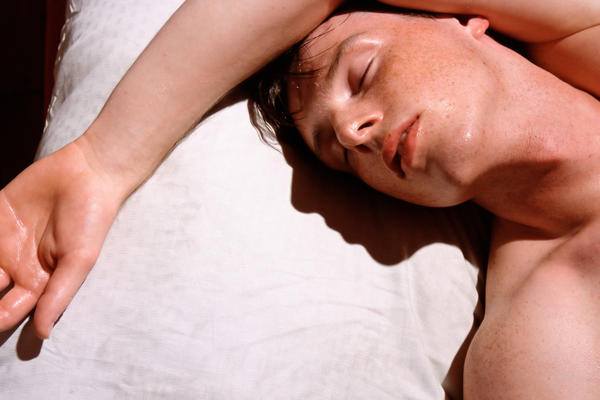Sweating is normal, and it is your body's way to keep it cool in the heat. It also signifies hormonal changes, signals emotions, and helps fight infections. It is common for adults to experience a degree of armpit sweating and body odor. Excessive sweat can cause skin irritation and put you in embarrassing situations as well. Sometimes, it becomes important to take steps to avoid sweating profusely, especially at night. Find out more about what you can do about smelly sweat while sleeping.
What Causes Smelly Sweat While Sleeping?
If you don't want smelly night sweats,you first need to understand exactly what causes it in the first place. Here's a bit more about the underlying causes of why you're noticing smelly sweat while sleeping.
1. Bacteria and Perspiration
The bad smell you experience in the morning may well be due to bacteria and perspiration. You have bacteria on your skin, but when they are exposed to sweat, they may break down the perspiration to cause body odor.
2. Diet
What you eat will have a huge impact on your life, and your dietary habits can certainly alter the way you smell. You're more likely to deal with sour body odor when your diet includes onions, garlic, and caffeinated beverages. Many other foods may also exacerbate body odor. The best way to determine what's causing the sour body odor is to keep a food diary and write everything you eat during the day. Keep updating your diary for some time and you will notice a pattern there.
3. Body Odor
Different things will cause body odor at different times. You will notice regular body odor caused mainly due to poor hygiene. The health of your kidneys and liver will also have an impact on your body odor. These organs eliminate toxins from your body through your skin, sweat, and breath, and excessive smell may mean these organs aren't working optimally.
4. Menopause and Perimenopause
You may notice sweet smelling sweat at nightas a symptom of menopause. The important thing to understand is that you may experience these symptoms even a year before the actual cessation of your menstrual cycle.
5. Infection
Several types of infections may well be the underlying causes of night sweats. The most common culprits are endocarditis (inflamed heart valves), tuberculosis, abscesses (in the appendix, boils, diverticulitis, and tonsils), and HIV infection.
6. Medications
The medications you use may also lead to night sweats. It is usually common when you rely heavily on antidepressant medications. The research has shown that about 8% to 22% of people who are on antidepressants complain about night sweats. Many other psychiatric drugs may also cause this condition. Medicines like acetaminophen and aspirin may sometimes cause smelly sweat while sleeping.
7. Hypoglycemia
If you're suffering from diabetes and are on oral diabetes medications, you may experience hypoglycemia at night. This usually means your blood sugar level drops at night and produces many other symptoms, along with excessive sweating.
8. Neurologic Conditions
Although it is quite rare, some neurologic conditions, such as posttraumatic syringomyelia, autonomic dysreflexia, autonomic neuropathy, and stroke, may also cause excessive sweating at night.
9. Cancer
Sweating profusely at night may well be an early symptom of cancer. It usually is quite common in lymphoma. It is important to mention though that you will experience other symptoms as well, such as fever and quick, unexplained weight loss.
What to Do About Smelly Sweat While Sleeping?
 Once you know the real cause behind your night sweating, it usually becomes easier to correct this condition. Here's a bit more about what you can do about night sweats.
Once you know the real cause behind your night sweating, it usually becomes easier to correct this condition. Here's a bit more about what you can do about night sweats.
1. Keep Your Room Temperature Low
The first thing you can do is keep your room cool enough to avoid sweating at night. You may also consider removing some of the coverings to let air come in your room. In so many cases, night sweats and body odor are usually caused by elevated body temperature, and sleeping in warm rooms with too many blankets is surely going to raise your body temperature.
2. Have a Well-Balanced Diet
Like mentioned, you need to keep an eye on what you eat. Opt for a well-balanced diet and avoid eating too much of garlic, curry, and other spicy foods. Your body cannot digest these food items, so they leave your body in the form of sweat, which is obviously going to create a strong smell as well. Limit these foods to see an improvement in your situation.
3. Shave Your Underarms
Having hair under your arms is yet another reason why you have a strong body odor. The best thing is to shave your underarms to trigger the evaporation of sweat and have fewer bacteria. If you sweat a lot and exercise as well, it is a good idea to wash your armpits several times a day. Waxing may also help, especially if your crotch area is the real problem.
4. Use Breathable Clothing
You need to switch to natural fibers, such as silk, linen, light wool, and cotton to prevent body odor. Wearing breathable clothing will always help decrease sweating. You may also consider buying such exercise clothing that offers high-tech fabric designed specifically to wick away moisture from your body. This prevents bacteria from getting to the sweat and causing bad smell.
